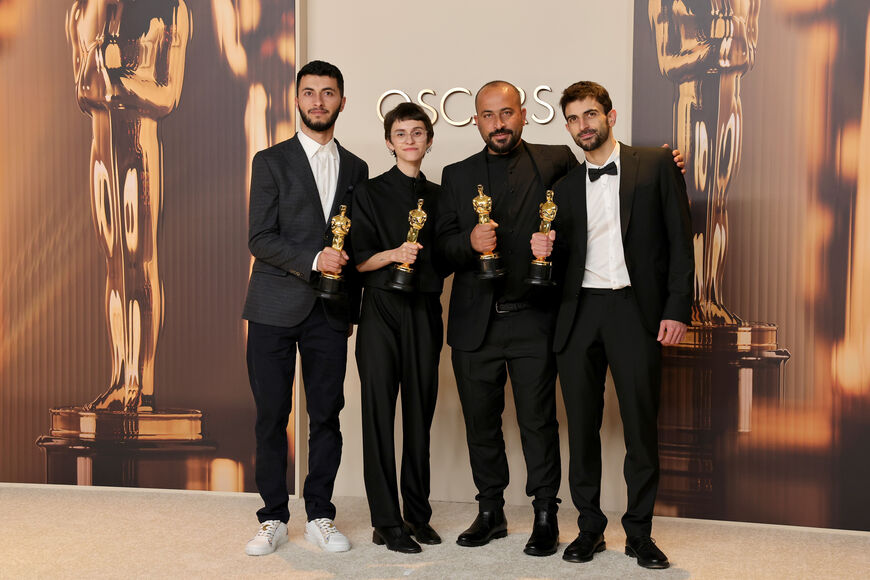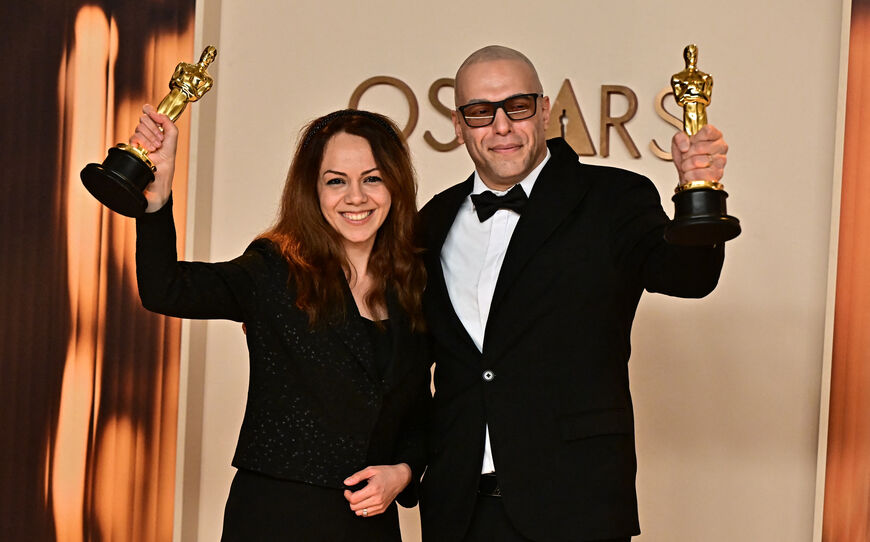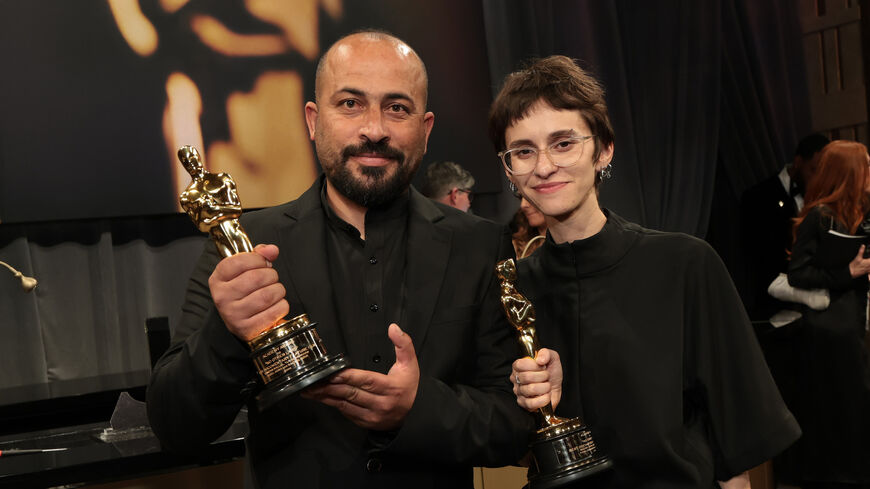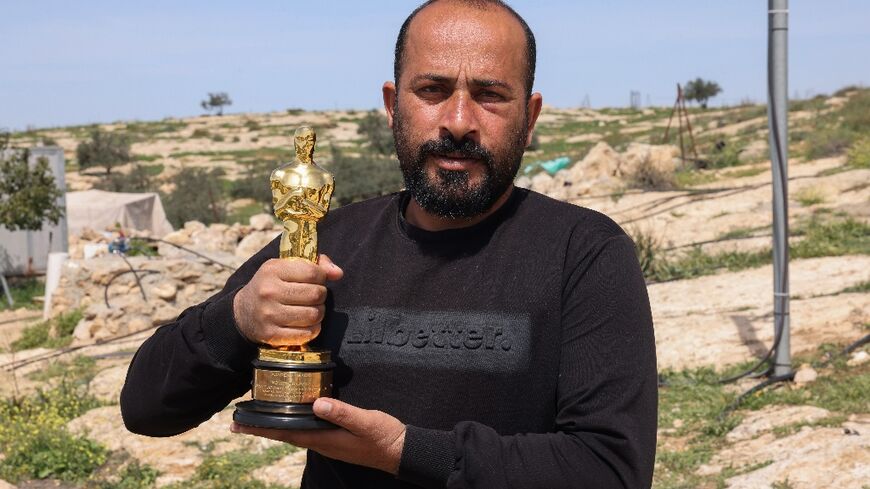Palestinian-Israeli documentary, Iranian film win at Oscars: What to know
Two films from the Middle East won Oscars at Sunday's Academy Awards, highlighting the growing reputation of the region's film industry at a time of ongoing tensions and crises.
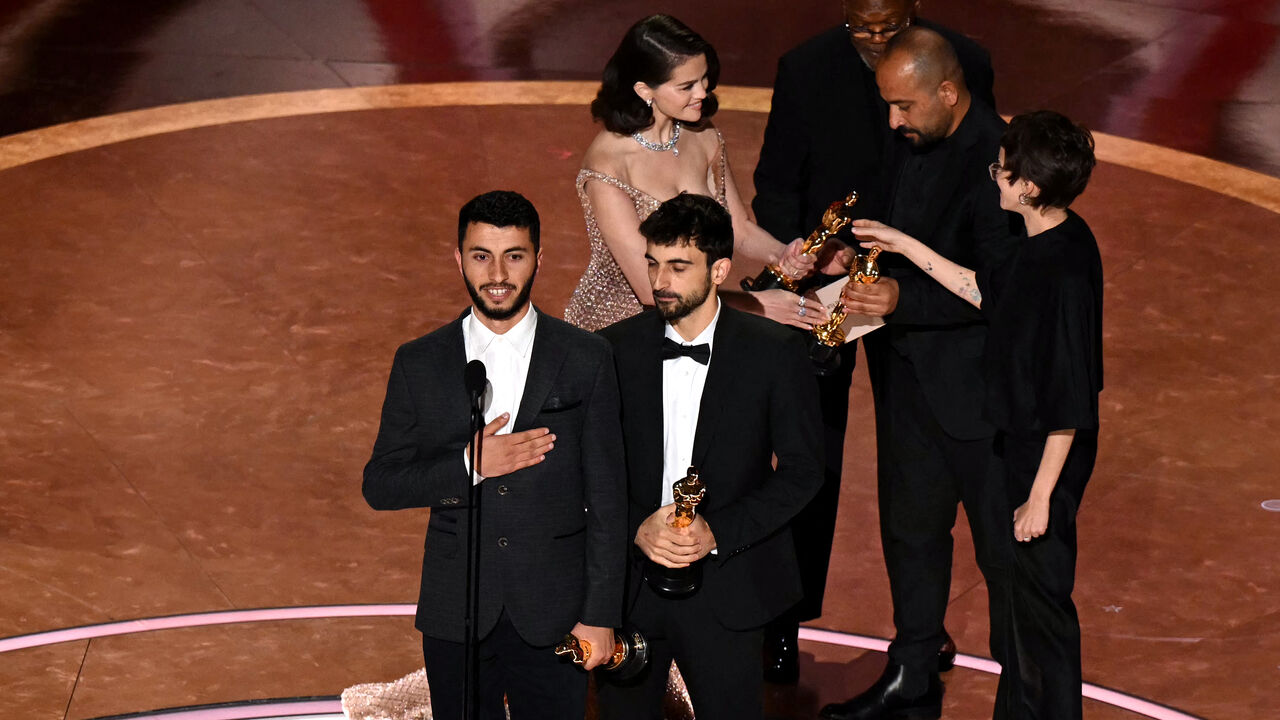
Despite distribution and mounting political challenges for their staff, two Middle Eastern films — the first a Palestinian-Israeli documentary and the second an Iranian short film — won an Oscar at 97th Academy Awards held in Los Angeles on Sunday.
The Israeli-Palestinian documentary “No Other Land,” directed by Israeli journalist Yuval Abraham, Israeli film director Rachel Szor, as well as Palestinian journalist Basel Adra and Palestinian film director Hamdan Ballal, won the Oscar for Best Documentary Feature Film.
The documentary chronicles the Israeli forces’ continued attempts to evict Palestinians from their homes in Masafer Yatta, a collection of Palestinian villages located in the south of Hebron governorate, in the southern West Bank.
The 92-minute documentary follows Adra, who co-directed the film, as he documents the evictions and Israeli demolition of his hometown of Masafer Yatta throughout the years, which Israel designated as a military firing and training zone in 1981.
Footage from Adra’s childhood also features in the film, including his father’s arrest and his own participation in a protest against the Israeli demolitions when he was just seven years old.
Eventually, Adra befriends Jewish-Israeli journalist Abraham who came to the village to report on the events. The film highlights the unexpected friendship between Adra and Abraham who come from opposing sides of the conflict as they try to expose the realities of life under occupation and inequalities between Israelis and Palestinians.
Filming of “No Other Land” began in 2019 and ended in October 2023, just a few days before Hamas’ cross-border assault on southern Israel on Oct. 7, 2023, that triggered the 15-month devastating Israeli war on the Gaza Strip.
The film premiered in February at the 74th Berlin International Film Festival.
The Oscar win comes as the Israeli military intensifies its raids in West Bank towns and villages as a part of its “Iron Wall” military operation launched in January, which it says is aimed to “thwart terrorism.”
On Sunday, just before the award ceremony, Israeli settlers, accompanied by Israeli forces, attacked residents of Masafer Yatta, throwing stones at them and destroying property, the official Palestinian WAFA news agency reported. Israeli forces also arrested four Palestinians during the attack.
In their acceptance speech, Adra and Abraham condemned the Israeli occupation of Palestinian territories and called for an end of Israeli violations against Palestinians.
Watch the speeches @basel_adra and @yuval_abraham gave after winning the Oscar tonight for their movie "No other land" pic.twitter.com/KBC4khKFKL
— Barak Ravid (@BarakRavid) March 3, 2025
“About two months ago, I became a father, and my hope to my daughter is that she will not have to live the same life I’m living now, always fearing settlers, violence, home demolitions and forcible displacements that my community of Masafer Yatta is living and tasting every day under Israeli occupation,” Adra pleaded.
The Palestinian activist said the documentary depicts “the harsh reality that we’ve been enduring for decades and still persists,” calling on “the world to take serious actions to stop the injustice and to stop the ethnic cleansing of Palestinian people.”
For his part, Abraham said the documentary was made by both Israelis and Palestinians, “because together, our voices are stronger.”
“We see each other. The atrocious destruction of Gaza and its people which must end. Israeli hostages, brutally taken in the crime of Oct. 7, which must be freed,” he said.
He also criticized the Israeli government over its discriminatory policies against Palestinians in the West Bank.
“When I look at Basel, I see my brother. But we are unequal. We live in a regime where I am free under civilian law and Basel is under military laws that destroy lives that he cannot control,” Abraham said as he urged for a political solution to the Israeli-Palestinian conflict “without ethnic supremacy, with national rights for both of our people.”
But he said, the US foreign policy is blocking this path. Of note, “No Other Land” has not been picked up for distribution in the United States.
Israel’s Culture Minister Miki Zohar criticized the documentary for its portrayal of Israel, saying it distorts the country’s image to the world.
“Freedom of expression is an important value, but turning the defamation of Israel into a tool for international promotion is not art — it is sabotage against the State of Israel, especially in the wake of the October 7th massacre and the ongoing war,” he wrote on X on Monday.
Iranian short film bags Oscar
Iranian short animated film “In the Shadow of the Cypress,” co-directed by Hossein Molayemi and Shirin Sohani, won the Oscar for Best Animated Short Film at the ceremony on Sunday.
The 20-minute, dialogue-free animation delves into the life of a former captain grappling with post-traumatic stress disorder as he strives to reconnect with his daughter in their secluded seaside home. After a whale washes up near their home, the daughter refuses to give up on the animal, while the father isolates himself inside their house where he suffers traumatic flashbacks.
The film, which was self-financed and took more than six years in the making, premiered at the 80th Venice International Film Festival in 2023.
In one interview with Directors Notes before the Oscar win, Molayemi spoke about the challenges they faced while making the film in Iran, citing the sanctions, the currency devaluation as well as the lack of government funding. He and Sohani were forced to fund the film from their own pocket, and film making took 6½ years to be completed.
The co-directors also almost missed attending the Academy Awards as their US visas were only approved a day earlier.
ugh I love watching people's dreams come true. here's the reaction from the creators of In the Shadow of the Cypress, who just won the Oscar for Best Animated Short pic.twitter.com/MAf7nqyuK4
— Spencer Althouse (@SpencerAlthouse) March 3, 2025
Sohani addressed the audience, expressing her astonishment. “Until yesterday, we hadn't even obtained our visa and we were totally disappointed, and now we are standing here with this statuette in our hands,” she said. The pair arrived at Los Angeles International Airport only three hours prior to the start of the show on Sunday.
Molayemi dedicated the award to people struggling with mental health issues as well as Iranians suffering daily hardships.
“We dedicate our film and this special award to all those who are still fighting in their inner and outer battles, heroically and nobody knows about that. Especially to our fellow Iranians, who are still suffering,” he said in his acceptance speech.
“Just the fact that we managed to make this film under the extraordinary circumstances of our country is a miracle," Molayemi continued, in an apparent reference to the censorship challenges faced by Iranian filmmakers and artists in Iran.
“In the Shadow of the Cypress” became the fourth Iranian film to win an Academy Award, following “A Separation” (2012) and “The Salesman” (2017) both by Asghar Farhadi, as well as “The Wind Will Carry Us” (1999) by Abbas Kiarostami.
Despite the global success of Iranian films, Iranian filmmakers still face challenges in Iran due to strict censorship laws. The Iranian government imposes regulations that control content deemed politically sensitive, immoral or against Islamic values, and require permits by the Ministry of Culture and Islamic Guidance.

